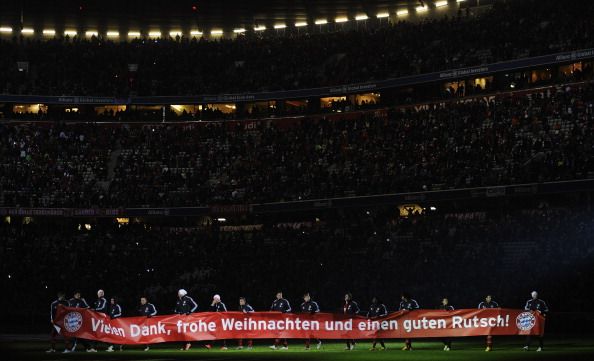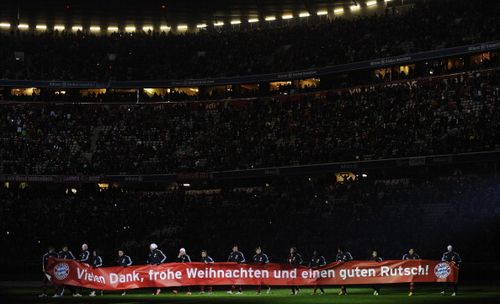
European Football: The price of success

What is success? It was an interesting question posed by Bayern Munich general manager Uli Hoeneß recently, as the Bavarian side sneaked through to the Champions League quarter-finals by defeating Arsenal. Money, the determinant on many supporters’ lips, is only part of the solution says the former German international. After all, while finance is a means to a football end, it is explicitly not the definitive goal at Bayern.
Hoeneß’ assertion poses an interesting challenge at a time when Europe’s football landscape is evolving from one dominated by English clubs to potentially a more fragmented picture. While English clubs competed in seven finals in eight seasons from 2005, the Premier League is absent from the final eight of the continent’s leading competition this year.
Manchester United, Chelsea, Arsenal and Manchester City each crashed out of the Champions League prematurely, leaving England without a quarter-finalist for the first time since 1996. Meanwhile, three sides from Spain, two from Germany and one each from Turkey, France and Italy made it though from the round of 16.
Ownership structure, or indeed financial motivation, may have only a passing correlation to progress in the competition, but Hoeneß and executives at the other German quarter-finalist, Borussia Dortmund, point to more than 50 per cent fan control as a guiding principle. Similarly, Barcelona and Real Madrid is each entirely owned by the ‘socios’ – club members – as is Turkish champions Galatasary.
In each case, league regulations have either reinforced or explicitly mandated the policy. In Germany, the 50+1 rule states that members of a club must retain more than 50 per cent ownership, preventing any single private entity taking control. Meanwhile in Spain, both Barça and Real, together with Athletic Bilbao and CA Osasuna, are supporter-owned. In Turkey, all clubs are fan-owned as no other form of ownership is permitted.
Of the remaining quarter-finalists, Juventus is majority-owned by the Agnelli family, in charge of the Turin-based club since 1923, while both Malaga and Paris Saint Germain are in Middle Eastern hands.
And with fan ownership, says Hoeneß, comes a supporter-friendly policy. After all, cheap ticket prices at Bayern and Dortmund are the envy of many United fans now priced out of Old Trafford.
“I only want to have big sporting success on a sound economic basis,” said Hoeneß, who played 239 times for the club and 35 times for the national team.
“It’s no fun to win the championship or Champions League with a £50-£60 million loss. The cheap tickets are for young people and the people who cannot afford it otherwise. Football must always be affordable.
“When you only pay €15 (£12) you can’t say, ‘I hate these millionaires’ because you cannot finance the millionaires with €15. The €15 tickets are standing seats behind the goals. Our most expensive season ticket is around €800.”
By comparison, United’s cheapest ticket is £30 in the East and West Lower, while the most expensive non-executive season ticket in the South Stand is priced at £950 for 19 league matches – the result of cumulative ticket prices increases in the five years following the 2005 Glazer takeover.
Cheap pricing has created an imbalance in Bayern’s income – €368.4 million revenue in the last financial year was heavily skewed towards commercial activity, with matchday turnover just 23 per cent of total revenues.
Acceleration in United’s commercial strategy in recent years, together with rapidly increasing media rights, means that the club posts balanced revenue streams of approximately a third each from broadcast, commercial and matchday income.
The difference, says Hoeneß, is that Bayern’s strategy is based on a long-term vision, while United’s paymasters seek profit first.
“I do not compare ourselves to United for instance which is a very big club and famous and one I admire greatly,” adds Hoeneß.
“But Mr Glazer didn’t know where Manchester was 20 years ago. He doesn’t do it because he loves United. He wants to make money.
“At Bayern we don’t look always for short-term success. I’ve won about 20 titles. To win the 21st title I’ll not sell out the club. But if somebody comes in who’s won nothing, he wants to win quickly and under this pressure he makes decisions which can be very difficult.”
Bayern currently leads the Bundesliga by 20 points, with outgoing manager Jupp Heynckes set to hand Pep Guardiola an emphatic championship winning team next season.
Although, in that there is also a contradiction, with Bayern having spent more than £60 million on Javi Martínez, Mario Mandzukic, and Xherdan Shaqiri last summer to wrestle the title back from Dortmund.
Not that Sir Alex Ferguson’s side has regressed after last season’s disappointments. United boasts an impressive, if not equal, 15 point lead over City in the Premier League even if European disappointment will not easily be forgotten. Much of United’s success this season has been driven by Robin van Persie’s £24 million acquisition.
Moreover, with media and commercial income racing ahead, and last summer’s IPO proceeds partially paying down debt, the club is on a healthier financial footing than at any time over the past seven years. The Glazers may never run the club debt free, but at £360 million gross, debt is no longer the existential threat it once was.
Yet, Hoeneß’ point is one of principle rather than financial nuance; that a football club exists to be that – serving its principle stake-holders, the supporters. It is a philosophy ingrained into German, Spanish, and Turkish football, among others.
After all, while United’s profits may rise sharply in the coming years, driven by new sponsorship income and a huge new Premier League television deal, there is little sign of a change in ownership philosophy. Old Trafford’s supporters will forever remain a body without voice or power.
And for the moment, it is Hoeneß’s side, and not United, that can look forward to a European quarter-final next month.